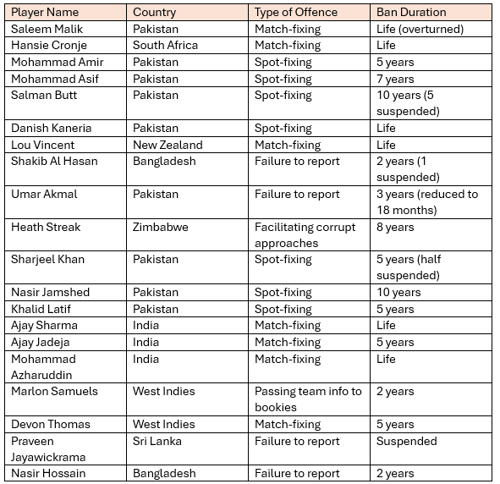
JERSEY – A talk on the ICC's “Anti-Corruption Efforts in Cricket” and keeping cricket clean.
31/08/2025
FRIDAY 29 AUGUST I attended a fascinating presentation about “Anti-Corruption Efforts in cricket”, which was delivered by Mr. David Spy, Anti-Corruption Manager at the International Cricket Council (ICC) Anti-Corruption Unit
HERE IS WHAT I LEARNT:-
- Cricket and its players often find themselves in the spotlight, both for their on-field performances and off-field actions. Over the years, the sport has been in the news for both positive highlights and serious controversies.
- Several top international cricketers have faced bans due to issues like match-fixing, spot-fixing, or not reporting corrupt approaches. (see below for those caught)
- The ICC Anti-Corruption Unit (ACU) is the global watchdog tasked with protecting the integrity of international cricket.
THE ACU OPERATE GLOBALLY AS FOLLOWS:-
The ACU
- Is headquartered in Dubai, but its network spans across cricket-playing nations, including India, South Africa, England, Pakistan, New Zealand, and more.
- Support Associate Members like the UAE, Nepal, and Scotland in building their own anti-corruption frameworks.
The ACU also operate
- Globally, across all ICC-sanctioned international matches.
- Domestically, through partnerships with national cricket boards (e.g., BCCI, ECB, CA).
- On-site, with Anti-Corruption Managers (ACMs) present at venues and team hotels.
- Digitally, monitoring online betting markets and social media platforms.
THE ACU MISSION AND FOCUS?
- The ICC ACU's mission is to prevent, disrupt, investigate, and prosecute corruption in cricket. Their focus includes:
- Match-fixing and spot-fixing
- Betting-related corruption
- Player grooming and manipulation
- Use of social media and communication apps for corrupt approaches
- Education and awareness for players and officials
WHAT ARE THE CHALLENGES
- Betting Market Complexity
- Cricket is the most bet-on sport globally, with vast sums wagered on matches.
- The rise of online and in-play betting, especially in unregulated markets, makes monitoring and intervention difficult.
- Sophisticated Corruptors
- Fixers use grooming tactics and trusted insiders to approach players.
- Their methods evolve to avoid detection, posing a persistent threat to the sport's integrity.
- Technology & Communication Apps
- Encrypted messaging apps and social media are increasingly used for corrupt approaches, complicating monitoring and evidence collection.
- Proliferation of T20 Leagues
- The rapid growth of domestic and franchise T20 leagues, particularly in emerging cricket nations, introduces new vulnerabilities due to inconsistent anti-corruption infrastructure.
- Spot-Fixing & Micro-Fixing
- Manipulation of small, specific events within matches is more complex to detect and prove, especially when outcomes are unaffected.
- Legal & Jurisdictional Gaps
- Inconsistent legal frameworks across countries limit the ACU’s ability to prosecute offenders and enforce disciplinary actions.
- For example:- Match fixing is not illegal in India!!
- Education & Awareness Gaps
- Lower-tier and associate players often lack awareness of corruption risks, making them more susceptible to manipulation.
- Resource Constraints
- The ACU has a global mandate but limited personnel and resources, making comprehensive monitoring and enforcement challenging.
HOW DO THEY DO IT?
THE ACU OPERATES THROUGH A MULTI-LAYERED STRATEGY:
- Prevention
- Conducts education sessions for players, coaches, and officials.
- Shares guidelines on how to identify and report corrupt approaches.
- Enforces minimum standards at venues (e.g., no mobile phones in dressing rooms).
- Disruption
- Monitors suspicious behaviour and betting patterns.
- Works with domestic ACUs and law enforcement to intervene early.
- Investigation
- Gathers intelligence from players, officials, and external sources.
- Uses former law enforcement professionals to conduct investigations.
- Maintains a hotline for reporting suspicious activity.
- Prosecution
- Refers cases to disciplinary committees or legal authorities.
- Supports legal proceedings under national laws (e.g., Sri Lanka’s Prevention of Offences Relating to Sports Act).
- Cricketers Caught in Corruption
- Here are some notable cases of corruption in cricket, including match-fixing, spot-fixing, and failure to report corrupt approaches.
- It is intended for training and awareness purposes to highlight the importance of integrity in the sport.

Further reading and sources
- About ICC Anti-Corruption | About ICC Cricket | ICC https://www.icc-cricket.com/about/integrity/anti-corruption/about-us
- https://www.icc-cricket.com/news/meet-the-team-anti-corruption-intelligence-investigations
- https://en.wikipedia.org/wiki/List_of_cricketers_banned_for_corruption
- https://www.thecricketpanda.com/international-cricketers-who-got-banned/
- https://www.crictracker.com/cricket-appeal/10-scandals-involving-match-fixing-spot-fixing-and-corruption-that-rocked-cricket/

The Team
Meet the team of industry experts behind Comsure
Find out moreLatest News
Keep up to date with the very latest news from Comsure
Find out moreGallery
View our latest imagery from our news and work
Find out moreContact
Think we can help you and your business? Chat to us today
Get In TouchNews Disclaimer
As well as owning and publishing Comsure's copyrighted works, Comsure wishes to use the copyright-protected works of others. To do so, Comsure is applying for exemptions in the UK copyright law. There are certain very specific situations where Comsure is permitted to do so without seeking permission from the owner. These exemptions are in the copyright sections of the Copyright, Designs and Patents Act 1988 (as amended)[www.gov.UK/government/publications/copyright-acts-and-related-laws]. Many situations allow for Comsure to apply for exemptions. These include 1] Non-commercial research and private study, 2] Criticism, review and reporting of current events, 3] the copying of works in any medium as long as the use is to illustrate a point. 4] no posting is for commercial purposes [payment]. (for a full list of exemptions, please read here www.gov.uk/guidance/exceptions-to-copyright]. Concerning the exceptions, Comsure will acknowledge the work of the source author by providing a link to the source material. Comsure claims no ownership of non-Comsure content. The non-Comsure articles posted on the Comsure website are deemed important, relevant, and newsworthy to a Comsure audience (e.g. regulated financial services and professional firms [DNFSBs]). Comsure does not wish to take any credit for the publication, and the publication can be read in full in its original form if you click the articles link that always accompanies the news item. Also, Comsure does not seek any payment for highlighting these important articles. If you want any article removed, Comsure will automatically do so on a reasonable request if you email info@comsuregroup.com.


